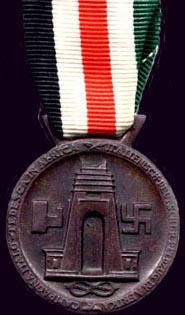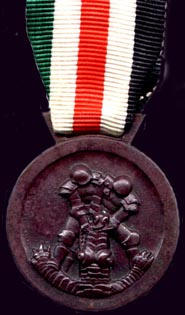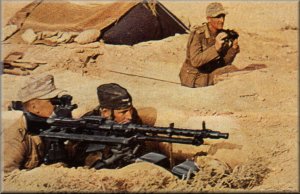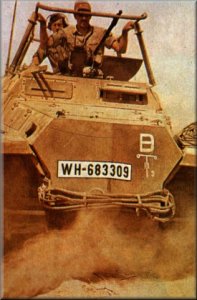
Italy was among the first and most famous Axis countries to join the Germanys cause. Its flamboyant dictator, Benito Mussolini, provided a political example on the seizure of power, which Hitler followed. With many goals in common, they would become Allies and friends.
Italy entered the War in July of 1940 as the French Campaign was drawing to a close. The Italian Army, though unprepared for war, crossed the border in an attempt to reap the spoils. It would be a long road for the Italian soldier, who fought the length of the war often with courage but almost always with inferior equipment. Along with France came Africa, where Italian interests were severally compromised after a series British of attacks. The legendary Afrika Korps, lead by Field Marshall Erwin Rommel, arrived to help in 1941 and wreaked havoc in the dessert during the next two years. The Italian Army went on to fight on many fronts, from the Balkans to Russia.
On July 25, 1943 with the war turning against Italy and the Allies landing in Sicily, Benito Mussolini was deposed and arrested. In September of the same year, Badoglio announced an armistice with the Allies before fleeing along with the King into their custody. Germany, aware of this development in advance, quickly invaded and disarmed the Italian Army. The problem facing them was that Mussolini was being held at an undisclosed location, and any hope of restoring order hinged around him. After a frantic search, he was located, and German Parachutists under the direction of Otto Skorzeny staged a daring rescue mission. El Duce was brought back safely, and on September 23rd, 1943, the "Repubblica Sociale Italiana" (RSI) was founded. Italy, or at least part of it, continued on the Axis camp.
Many experienced units (some veterans of the Eastern front) of the former Italian Army were absorbed into the “Esercito Nazionale Repubblicano” and continued to fight until the end. Because of mistrust on the part of the OKW, they were not extensively used in combat roles but did well when they were called upon. The end of the war found the RSI in existence. In the chaos that reigned in the days prior to the surrender, Mussolini, and many members of the Esercito Nazionale Repubblicano, were butchered by newly formed “partisans” units.
As official Axis Allies, soldiers from both nations were decorated with
German and Italian awards. Italian Awards will be covered in the following
pages.
Italo-German Campaign Medal in Africa
Medaille fur den Italienisch-Deutschen Feldzug in Afrika
 |
 |
This medal was designed by De Marchis and was instituted by the Italian Government to reward the achievements of Rommel’s Afrika Korps. The medal was awarded only to German troops and the first presentations took place in 1942.
The Italo-German Campaign Medal was initially produced in solid Bronze, but war time shortages forced a switch to “war medal” with a Bronze finish. It measured 31mm by 31 mm, with a ribbon device that measured 6 mm in height and 18 mm in width.
The obverse of the medal is concave and features two gladiators symbolizing Italy and Germany doing battle with a crocodile, which symbolizes Britain. The reverse shows a swastika and fasces, each on one side of the Italian Felini Arch again depicting Italo-German cooperation. Under the arch is the Royal Knot of the House of Savoy. Around the rim of the reverse is the inscription “Italo-German Campaign in Africa”, in German (on the side of the swastika) and in Italian separated on top and bottom by two single leaves. A 25mm ribbon bearing the colors of Italy and Germany (black/red/white/green) suspended the medal. It was produced principally by F.M. Lorioli and sons of Milan, but a variety of smaller manufacturers also made the award. The Lorioli manufacturer mark is present on a majority of medals above either the right or the left leg of the crocodile. This mark consists of the inscription “LORIOLI MILANO”. The absence of a manufacturer marks denotes that the award was produced by a smaller firm.
The award was presented to DAK members. Because Italy was an Axis Ally German soldiers were allowed to wear the award, but there were no regulations specifying a particular method. Due to Italy’s withdrawal from the war and subsequent surrender, the wear of all Italian awards was prohibited in orders distributed dated March 29th, 1944. Specific mention is made of the Italo-German Campaign Medal.
 Above; DAK MG-34 nest. Right; A Recon Sd.Kfz 250 Half Track |

|
Italian Awards Coming Soon
![]()
© Copyright Wehrmacht-Awards.com LLC |